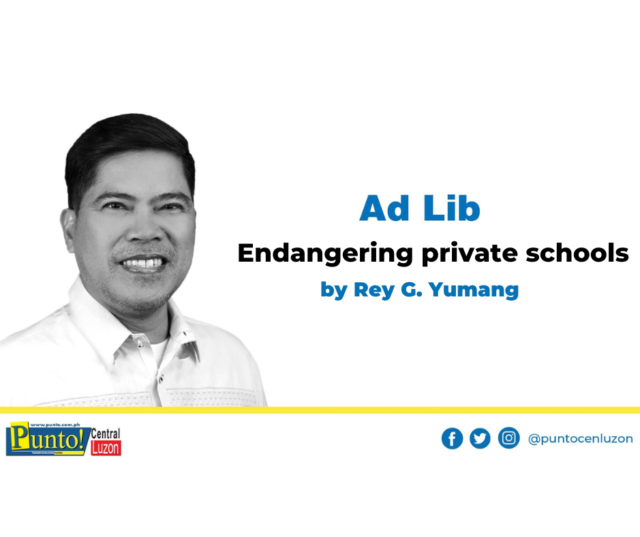WITH LESS than two months before the School Year 2022-2023 of the “Now Normal” officially ends, private educational institutions all over the country are now facing another potential stumbling block that will lead to their untimely demise. No, this is not the fear from another wave of the Covid-19 pandemic. The irony of it all is that this new threat is coming from our own lawmakers.
On third and final reading last March, both House Bill 7584 and Senate Bill 1359 were approved and are now at the Bicameral Conference Committee level. In a nutshell, these bills intend to prohibit both public and private educational institutions from imposing the “no permit, no exam policy” – a measure that bars students with outstanding financial and/or property obligations from taking examinations and other assessments.
At a glance, these two bills appear to be worthy addition to our long list of education laws to protect our learners. But what good will these two bills do if they protect learners on one hand, and endanger the continued operations and financial stability of private schools on the other? Protecting the welfare of the learners should never be at the expense of the other stakeholders that make up an educational institution.
For one, a “no permit, no exam policy” is entirely different from a “no payment, no exam policy.” While it is true that there were a few instances in the past when some private schools did not allow their students with unpaid financial obligations to take exams or join the year-end rites, it was more of the exception rather than the rule. Private schools have resorted to the issuance of regular and temporary permits, that both allowed students to take their exams. Similarly, the signing of promissory notes has been a long-standing practice of many private schools. In fact, most private schools even allow students with outstanding balances to join the year-end rites, come up the stage with their parents and receive their awards, medals and certificates. If this is not compassionate human consideration being shown by private schools, I do not know what is.
Lest our esteemed lawmakers forget, enrollment in a private school is in itself a contract between two parties – the school, and the learners and their parents. As a student pays the required school fees, the school is obliged to deliver the wide array of learning experiences, activities and interactions to ensure the holistic formation of each child. If a student fails to fulfill his or her obligation as stipulated in this ‘contract’ can the school now opt not to perform its duty as well? Technically it should; but that was never an option taken by private schools. Many parents can attest to the fact that although their children have unpaid monthly balances, they continue to go to their schools, attend classes, participate in various activities and enjoy the school facilities like the rest of their schoolmates with updated payments.
With the flexible payment options given to parents, the prompt, timely and updated payment of school fees is vital to the financial stability of private schools. With their high dependence on school fees, the cash position of any private school determines its ability to meet its obligations such as the payment of employees’ salaries, remittances to government institutions, and other administrative expenses, among others. If signed into laws, the two bills will give parents the blanket excuse to defer their payment even if they have the ability to do so. The bills will not teach the parents to prioritize their children’s education; it will give them an easy way to justify their non-payment of their obligations as a privilege protected by the law.
Truth be told, the interventions suggested by the bills such as ‘withholding the release of diplomas or certificates, denying admission or enrolment in the succeeding school year or semester, refusing the issuance of applicable clearances, and pursuing the settlement of outstanding financial or property obligations through appropriate legal action’ have already been in place since time immemorial. Private schools do not need another law to instruct them how to exercise compassion and consideration towards their financially-challenged students and their parents.
Private schools have long been practicing and living a culture of compassion and consideration towards their students and their parents. It’s high time that our lawmakers begin to recognize this and begin to craft laws that will truly protect both the students and the rest of the stakeholders.





